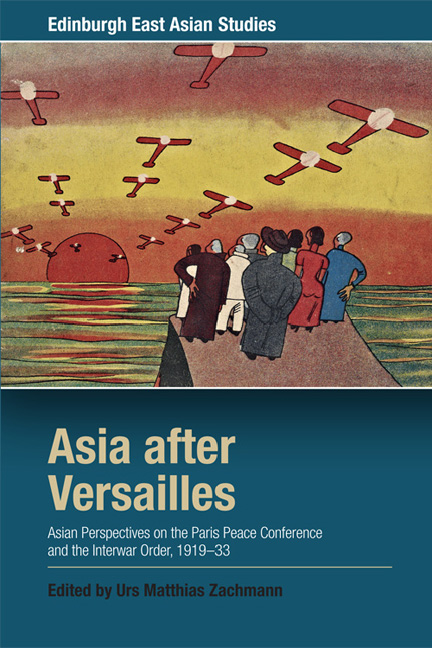 Asia after Versailles
Asia after Versailles from Part I
Published online by Cambridge University Press: 22 December 2017
According to dominant narratives about the transition from the world of empires in the mid-nineteenth century to the world of nation states in the mid-twentieth century, the Great War in Europe was the key turning point, with the double impact of Wilson and Lenin. The Bolshevik challenge to the imperial world order and the Wilsonian call for self-determination culminated in global expectations at the Paris Peace Conference and created a qualitative rupture in the international legality of the call for national self-determination of various anticolonial movements. In more recent histories, non-Western and subaltern actors are attributed agency in the triumph of the idea of national self-determination and sovereignty, although almost all of these international norms were traced back to Western Europe. It appears as if it was the subaltern and non-Western actors who fulfilled the promises of Western universalism and Western-originated values during their struggles against Western hegemony and colonialism. On the surface and in many retrospective accounts, this transition looks very straightforward. Empires were illiberal and oppressive of national rights, and nationalism was inevitable. Western and Japanese colonialism delayed this inevitable process, causing much suffering in their colonies and beyond. Yet, with the triumph of nationalism in Asia and the completion of decolonisation (which took up until the 1960s), the ideals of freedom from foreign hegemony, and natural rights to national sovereignty won over.
Many historical processes and events complicate and challenge this linear decolonisation narrative of transition from empires to nation states. During this transition, for example, pan-nationalist ideals were crucial. We cannot understand the nature of decolonisation without looking at the significant role played by pan-Islamic, pan-Asian and pan-African visions of world order. For example, pan-Islamism among Indian Muslims and their growing ties to the Ottoman Empire from the 1880s to the 1920s contradict a narrative of nationalism. In this process, the religious and political legitimacy of the caliphate institution as a symbol of global Muslim solidarity increased. The Ottoman Empire, perceived as the sick man of Europe, was increasingly seen as the leader and symbolic focus of unity for colonised Asian Muslims.
To save this book to your Kindle, first ensure [email protected] is added to your Approved Personal Document E-mail List under your Personal Document Settings on the Manage Your Content and Devices page of your Amazon account. Then enter the ‘name’ part of your Kindle email address below. Find out more about saving to your Kindle.
Note you can select to save to either the @free.kindle.com or @kindle.com variations. ‘@free.kindle.com’ emails are free but can only be saved to your device when it is connected to wi-fi. ‘@kindle.com’ emails can be delivered even when you are not connected to wi-fi, but note that service fees apply.
Find out more about the Kindle Personal Document Service.
To save content items to your account, please confirm that you agree to abide by our usage policies. If this is the first time you use this feature, you will be asked to authorise Cambridge Core to connect with your account. Find out more about saving content to Dropbox.
To save content items to your account, please confirm that you agree to abide by our usage policies. If this is the first time you use this feature, you will be asked to authorise Cambridge Core to connect with your account. Find out more about saving content to Google Drive.